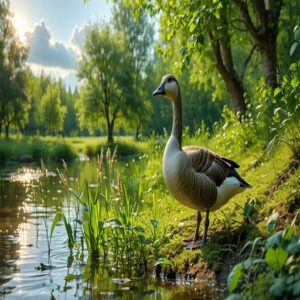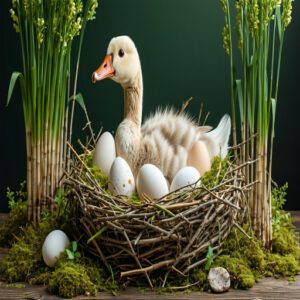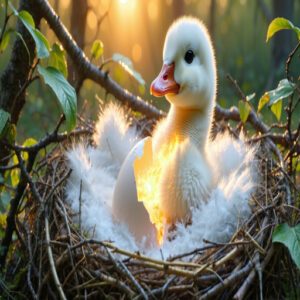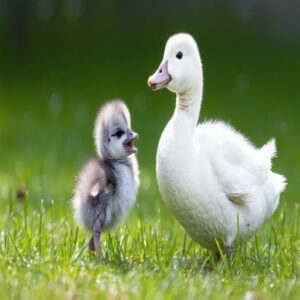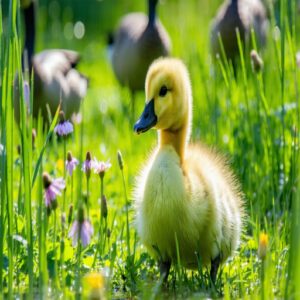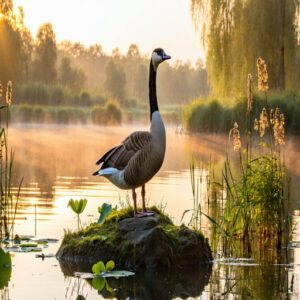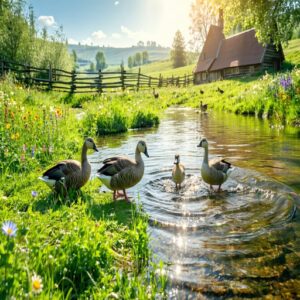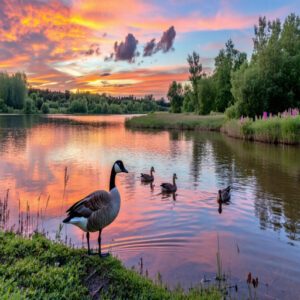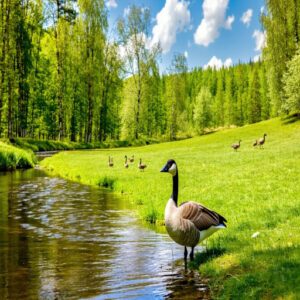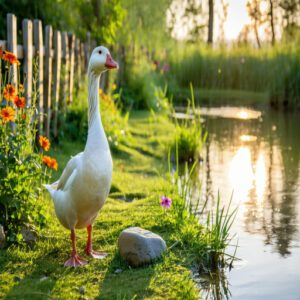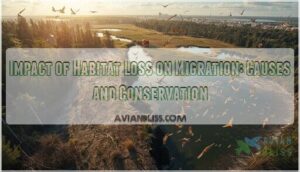This site is supported by our readers. We may earn a commission, at no cost to you, if you purchase through links.

Wild geese typically live 10 to 20 years, though their first year is tough due to predators and harsh conditions.
Domesticated geese, on the other hand, can thrive for 20 to 25 years when well cared for—and some even hit the 40-year mark! A safe habitat, proper nutrition, and regular health checks are key for extending their lifespan.
Wild or domestic, geese adapt well, but young ones wobbling their way through life face the greatest challenges.
Curious how your pet goose could join the 40+ club? Stay tuned!
Table Of Contents
- Key Takeaways
- The Lifespan of Geese
- The Average Lifespan of Geese
- Factors Affecting Goose Lifespan
- The Life Cycle of a Goose
- How to Extend The Life of Your Pet Goose
- Predators of Geese
- The Oldest Recorded Goose
- Surviving Winter: How Geese Adapt
- Longest-Living Geese Species
- Lifespan of Domestic Geese
- Frequently Asked Questions (FAQs)
- Do domestic geese have a longer life expectancy?
- How long do Canadian geese live?
- How long do emperor geese live?
- How long can a goose live?
- How long can a geese live as a pet?
- How long can a geese live without food?
- Can a goose live 100 years?
- How long do geese live as pets?
- What is the oldest goose ever recorded?
- Why is goose no longer eaten?
- Conclusion
Key Takeaways
- Wild geese typically live 10-20 years, but their first year is tough due to predators and harsh conditions.
- Domestic geese can live 20-25 years or even up to 40 with proper nutrition, safety, and regular health care.
- Predators, environment, and diet are key factors impacting a goose’s lifespan—protecting them and providing balanced meals makes a big difference.
- Regular exercise, clean water, and frequent vet check-ups help geese thrive and extend their life expectancy.
The Lifespan of Geese
A goose’s lifespan is like a running clock—its length depends on nature, care, and plain luck.
Wild geese, like Canada Geese, can live 10-20 years on average, with exceptional cases hitting 30+ years.
But here’s the catch: Geese mortality rates are highest in their first year thanks to predators like foxes or hawks.
Goose habitat and migration patterns also play a big role. Those in safer spots with milder winters tend to survive longer.
Proper care is key for domestic geese. Give them clean water, a balanced diet of grass, seeds, and berries, and you’re looking at a lifespan of 20-25 years—or even 40 for the lucky few!
These waterfowl longevity champs benefit from predator-free living and regular checkups. The life expectancy of domesticated geese proves they thrive with just a little extra TLC.
The Average Lifespan of Geese
Geese don’t just honk; they stick around for the long haul.
While the average lifespan of geese spans 10 to 20 years, their goose life expectancy depends on species, environment, and care.
Wild goose survival varies greatly—predators and harsh winters often bring their years to an early end.
Yet, they’re built for resilience with thick plumage and fat reserves.
Canadian geese are goose-longevity champions, sometimes living over 40 years in the right conditions.
For most breeds, though, you’re looking at an average goose age closer to 10-15 years.
Domesticated geese often hit their 20s (or beyond) if they’ve got good nutrition, safety, and healthcare.
Goose mortality rates for goslings are high—first-year survival isn’t guaranteed.
But with enough grit (and luck), geese lifespan becomes a demonstration of their adaptability, whether soaring in V-formations or waddling safely in your backyard.
Factors Affecting Goose Lifespan
A goose’s lifespan depends on factors like whether it lives in the wild or in captivity, what it eats, and how well it’s cared for.
Predators, diseases, and even its role during breeding season can all impact its chances of living a long, healthy life.
Wild or Domestic Geese
You’re likely wondering how wild and domestic geese differ regarding lifespan.
- Territorial instinct
- Flight patterns
- Grazing habits
- Flock dynamics
- Mating rituals
Wild geese exhibit unique behaviors, while domestic geese benefit from human care, impacting their geese lifespan and goose life expectancy.
Understanding geese lifespan factors is essential for their overall well-being and longevity.
Nutrition
To boost goose life expectancy, focus on nutrient balance at each stage.
Fresh grass, berries, and seeds meet most dietary needs, while goslings thrive on protein-packed chick starter.
Don’t overdo grain intake—moderation is key to avoid health issues.
Keep water quality of the highest standard to support digestion.
A well-rounded diet guarantees long-term goose care and healthier, happier geese.
Reproduction and Sex
Breeding seasons bring out fascinating mating habits in geese.
Ganders often compete fiercely for mates, showcasing a lively goose courtship. Once paired, geese form monogamous relationships, sticking together for life.
The sex ratio in flocks impacts goose reproduction, as balanced numbers make pair bonding smoother. During nesting, the gander stands guard while the goose prepares a cozy spot, often reusing the same site yearly.
A healthy reproductive cycle strongly influences the overall goose lifespan, especially for species like the domestic Chinese goose.
Healthcare and Care
Goose health starts with solid nutrition advice—think fresh greens, grains, and clean water daily.
Keep predators at bay with secure enclosures while ensuring habitat maintenance, like cozy shelters with ventilation.
Routine checks help spot issues early, and health supplements boost a goose’s resilience.
Veterinary tips? Worm them regularly to prevent disease, which is crucial for a cared-for domestic goose lifespan to reach 30 years.
For a successful experience, consider a Beginners Guide to learn more about raising geese.
The Life Cycle of a Goose
You’ll find that geese lead fascinating lives, starting as fragile eggs and maturing into majestic, honking adults.
Each stage of the goose life cycle—egg, hatchling, gosling, and adult—is packed with growth, challenges, and important lessons for survival.
Egg Stage
The egg stage kicks off the life cycle of geese with careful nesting habits and around 28-30 days of egg incubation.
A female lays up to nine eggs, and the fertilization process begins the incredible journey of embryo development.
Parents guard the nest fiercely, ensuring safety during this critical phase of the goose lifespan, fostering future generations.
Chicks Inside Eggs Stage
Inside the eggs, goslings work hard during the embryo stage, prepping to break free.
You might even hear gentle peeps before they pip their shells. Careful incubation guarantees proper egg development and chick formation, maintaining moisture and temperature for healthy fetal growth.
After about 28-30 days, this stage ends, signaling the start of their journey in the reproductive cycle.
Hatchlings Stage
After cracking free from their shells, hatchlings wobble into the world, soaked and squeaky.
Now it’s all about survival. Their fluff dries quickly, and mom leads the way. Over the next hours, they master waddling, recognize safety cues, and start exploring their surroundings.
Here’s what happens early on:
- Baby Feeding: They keenly eat small bits of grass.
- Hatchling Development: Downy feathers help with warmth.
- Early Survival: Strong parental oversight keeps predators at bay.
Gosling Stage
Goslings grow fast, shedding their soft down as strong adult feathers emerge—an important step in gosling development.
Over 6-9 weeks, their bodies strengthen for flight, prepping them for their role in the life cycle of a geese.
Keep them safe during this vulnerable time to boost the goose life span.
- Gosling Nutrition: Make certain they’ve access to grasses, grains, and clean water.
- Feather Growth: Wing feathers signal readiness to fly.
- Flock Behavior: Staying with the group means better survival odds.
Adult Goose Stage
You’ve fully grown, proudly wearing your sleek adult feathers and ready to take on life as a leader and lifelong partner.
At this stage, your social behavior shines—mating habits, flock dynamics, and adult migration all become second nature.
Whether raising goslings or coping with harsh winters, you’re a key player in survival.
| Season | Activity | Details |
|---|---|---|
| Spring | Mating/Nesting | Selecting a mate, building nests, laying eggs. |
| Summer | Parenting | Guarding goslings, teaching survival skills. |
| Fall | Migration | Leading synchronized flights to warmer climates. |
| Winter | Foraging/Survival | Finding food, preserving strength as a flock. |
The average life span of a goose varies—wild geese may live 10–20 years, while the goose lifespan in domestic environments extends to 25 years or more, making them a long-lived species with a significant life span.
How to Extend The Life of Your Pet Goose
You can help your pet goose live longer by focusing on proper nutrition, regular exercise, and preventive healthcare.
A little extra effort, like providing clean water and engaging activities, goes a long way in keeping them happy and healthy.
Proper Nutrition
Feeding your goose right isn’t just about filling their belly—it’s setting them up for a longer, happier life.
A balanced diet of fresh grass, grains, veggies, and occasional fortified pellets meets their nutrient needs, supporting the goose life expectancy.
Avoid overfeeding; obesity can cut years off their life span.
Wild-style grazing works best, keeping them active while munching nonstop.
Clean water quality matters too—it aids digestion and keeps them thriving.
Remember, food is fuel for their constant foraging instincts.
Whether it’s the average life span of a goose or the robust goose lifespan domestic, healthy feeding makes the difference.
For ideal nutrition, consider using goose food pellets as a supplement to their natural diet.
Exercise and Mental Stimulation
Keeping your pet goose physically and mentally active works wonders for their well-being and can even boost their goose life expectancy.
Try incorporating fun daily activities into their routine. Utilizing proper exercise tools can help create engaging activities for your pet goose.
- Geese Playtime: Let them roam and graze freely while exploring their environment.
- Bird Exercises: Encourage them to flap their wings, walk, and forage to stay healthy.
- Mental Health Boosters: Hide treats in tall grass or under objects for them to find.
- Social Interaction: Introduce them to other geese—it’s like a backyard “playdate.”
These simple habits strengthen their bodies, minds, and bond with you, naturally extending the lifespan of domestic geese, which is closely related to their overall well-being.
Veterinary Care and Preventive Measures
Your goose’s health isn’t something to wing.
Regular veterinary care, including vaccination protocols and nutrition counseling, plays a big role in extending goose longevity.
Geese are pros at hiding illness, so consistent health monitoring helps catch issues early.
A trusted vet can guide disease diagnosis and medical treatments, ensuring your domestic goose lifespan meets—or even surpasses—the average lifespan of geese with proper care.
To achieve good health, it’s vital to follow proper bird vet care tips and create a safe environment for your pet goose.
Predators of Geese
Understanding the threats to your geese is key to keeping them safe and sound.
Here’s what you need to watch out for:
- Raccoons, Foxes, and Eagles, Oh My: These crafty critters love snatching vulnerable goslings. Be especially vigilant during their early flightless days.
- Ground Control: Keep a close eye on your geese when they’re on the ground. Their inability to take to the skies leaves them exposed to ground-based predators.
- Urban Jungle Dangers: Even in the city, your geese aren’t entirely safe. Dogs and cats lurk in the shadows, ready to pounce on an unsuspecting bird.
- Raptor Danger Zone: Eagles and owls are a threat, too. These raptors could be eyeing your geese from above, so always stay alert.
- Safety First: Create a fortress for your flock with fencing, good lighting, and maybe even a guard dog or two. Taking these precautions seriously improves flock safety and goose lifespan.
To effectively protect your geese, it’s vital to understand bird facts about predators and their behaviors to create a secure environment.
The Oldest Recorded Goose
If geese could share their secrets, the oldest goose in the world would have plenty to say.
While geese typically live 10 to 20 years, some have shattered expectations. One Canadian Goose, astonishingly, surpassed 40 years, standing as a symbol of geese longevity and resilience.
That’s impressive for a bird avoided on golf courses!
The longest living geese breeds, like Canadian Geese, hint at how proper care can extend their lives. In domestic settings, some record-breaking geese, called “record age domestic geese,” enjoy decades of pampering, safe from predators.
The oldest goose on record isn’t just a statistic; it’s a reminder of how good habitats, solid diets, and maybe a lucky pair of wings can lead to incredible lifespans.
So next time you see a honking flock, think of these aging record breakers marveling nature’s design!
Surviving Winter: How Geese Adapt
When the frost bites, geese don’t just survive — they thrive with clever adaptations. They rely on feather insulation, fatty reserves, and oils to seal out the cold like nature’s winter jacket. Hungry for energy, they shift to scavenging grains when grassy snacks vanish.
- Winter Migration: Many geese head south, seeking warmer spots.
- Flock Behavior: Staying in groups provides shared body heat.
- Food Storage: Excess fat helps fuel long, frigid months.
Their ability to adapt is influenced by bird behavior seasonal changes that help them survive harsh conditions. Can a goose survive winter? Absolutely! Their resilience keeps their lifespan of geese impressive, despite harsh seasons.
Longest-Living Geese Species
Geese are known for their impressive lifespans, especially some standout species.
The Canada Goose, for example, has the longest lifespan of wild geese, often reaching 20+ years.
Other notable species like the White Chinese Goose and African Goose live 10-16 years, closer to the average lifespan of goose birds.
Habitat and breeding habits play a key role—wild goose longevity varies due to predators, while pet geese under good care can rival record-holders, like George, a 49-year-old gander.
Kindness keeps these birds thriving!
The Ross’s Goose species is a great example of arctic goose migration patterns that can impact their overall lifespan and survival rates.
Lifespan of Domestic Geese
The lifespan of domestic geese varies based on breed, care, and surroundings.
On average, they live 12-20 years, but with proper care, some reach 25-30 years.
Curious how to extend their lives?
Follow these tips:
- Prioritize Nutrition: Balanced Geese Diet Plans with greens, grains, and seeds.
- Provide Space: A clean, safe Goose Habitat meets their exercise needs.
- Regular Check-Ups: Boost Pet Goose Health by preventing diseases.
- Clean Water Access: Fresh, daily water supports Goose Feeding Tips.
- Predator Protection: Safeguard to guarantee a longer domestic goose lifespan.
Frequently Asked Questions (FAQs)
Do domestic geese have a longer life expectancy?
Imagine raising a feathered buddy who doubles as a lawnmower—domestic geese outlive their wild counterparts, hitting 20-30 years with decent care.
Shield them from predators, nail their diet, and they’ll stick around.
How long do Canadian geese live?
Canadian geese typically live around 10-20 years in the wild.
In captivity, they can thrive even longer, hitting 40 years if cared for properly and predators aren’t an issue.
How long do emperor geese live?
Emperor geese typically live around 12-15 years in the wild.
In captivity, good care can extend their lives to about 20 years, but their lifespan can drop due to predators or harsh weather conditions.
How long can a goose live?
Geese can live 10-20 years in the wild, depending on the species.
In captivity, with proper care, some can hit 30-40 years.
A balanced diet and safety from predators make a huge difference!
How long can a geese live as a pet?
If you’re “in it for the long haul,” pet geese can live 20-30 years with proper care.
Keep them safe from predators, provide fresh water, and feed them a balanced diet to guarantee longevity.
How long can a geese live without food?
Without food, a goose might survive around 3 to 4 days, depending on its health and environment.
Stress, weather, and energy use play big roles—starvation sets in quickly when reserves are exhausted.
Can a goose live 100 years?
No, geese can’t live 100 years.
The longest-lived geese, like Canada Geese, max out around 40 years in captivity with excellent care.
In the wild, they face too many challenges to reach such ages.
How long do geese live as pets?
Time really flies, doesn’t it?
As a pet, a goose can live 20-25 years, sometimes even 30 with proper care.
Good food, clean water, predator protection, and vet checkups keep them thriving.
What is the oldest goose ever recorded?
The oldest goose ever recorded lived over 40 years in captivity.
With proper care, geese can defy expectations, proving that a safe environment and good nutrition really put the "long" in long-lived!
Why is goose no longer eaten?
Goose isn’t as popular today partly due to its rich, gamey flavor and higher price compared to chicken or turkey.
It’s also less common in grocery stores, making your holiday bird hunt trickier.
Conclusion
Caring for geese isn’t just about keeping them alive—it’s about helping them thrive.
Whether in the wild or as pets, their lifespan depends on nutrition, safety, and veterinary care.
Wild geese may range from 10 to 20 years, but with your attention, domestic geese can soar past 25 years or more.
Want your pet goose to live its best life? Provide proper care, and who knows—they might just join the 40-year club!
How long do geese live? It’s up to you to ensure they receive the proper care needed for a long and healthy life.
- https://www.animalwised.com/how-long-does-a-goose-live-geese-lifespan-5016.html
- https://simplyecologist.com/how-long-do-geese-live-domestic-wild-geese/
- https://www.birdzilla.com/learn/how-long-do-geese-live/
- https://featheredrealm.com/how-long-does-a-goose-live/
- https://animal-world.com/goose-lifespan-how-long-do-they-live/

